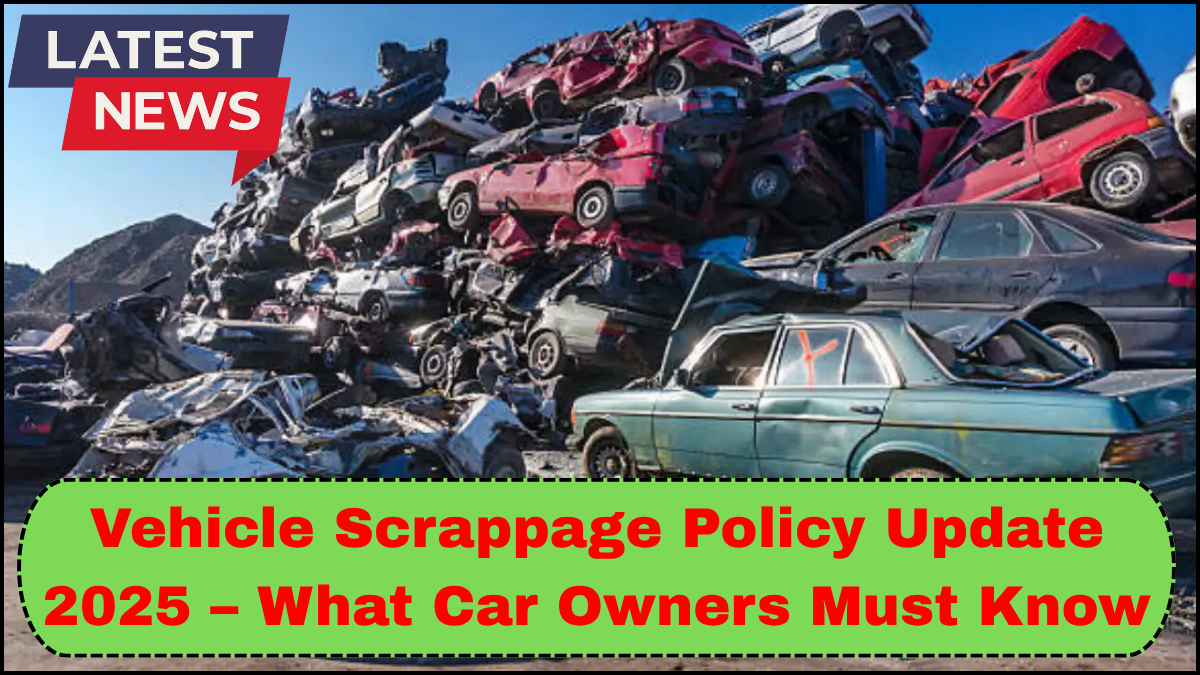India’s push toward sustainable mobility and cleaner air has taken another major step with the India Vehicle Scrappage Policy Update 2025. The revised policy is a crucial initiative aimed at phasing out old, polluting vehicles and encouraging the use of newer, more fuel-efficient models. Whether you’re a private car owner, fleet operator, or commercial vehicle owner, understanding the changes is essential to avoid penalties and make informed decisions.

Here’s what you need to know.
What Is the Vehicle Scrappage Policy?
Initially introduced in 2021, the Vehicle Scrappage Policy is a government-led framework that mandates the removal of unfit vehicles from Indian roads. Its primary objective is to reduce vehicular pollution, improve road safety, and promote the adoption of electric and fuel-efficient vehicles. The 2025 update builds on the original policy, tightening regulations and expanding its coverage.
Key Changes in the India Vehicle Scrappage Policy Update 2025
1. Stricter Enforcement of Fitness Tests
One of the biggest highlights of the update is the mandatory fitness test for all vehicles that are 15 years or older for petrol vehicles and 10 years or older for diesel vehicles. These tests must be conducted at automated testing stations authorized by the government.
Failing the fitness test means the vehicle cannot be re-registered and must be scrapped. This move directly supports the old vehicle ban initiative across several Indian cities battling air quality issues.
2. Compulsory Scrapping for Government Vehicles
Starting April 2025, all central and state government vehicles over 15 years of age will be scrapped. No exemptions will be allowed. This sets a strong example for private owners and fleet operators to follow suit and transition to newer, greener options.
3. Incentives for Voluntary Scrapping
The updated policy offers several benefits for owners who voluntarily scrap their old vehicles:
-
Scrappage certificate: Issued upon scrapping, it can be used to get a rebate on road tax (up to 25% for private vehicles, 15% for commercial).
-
Discount on new vehicle purchase: Many automakers offer additional discounts when a scrappage certificate is presented.
-
Waiver on registration fees for the new vehicle.
These incentives are designed to make the switch financially viable for consumers.
4. Penalty for Non-Compliance
Continuing to use an unfit or deregistered vehicle will attract heavy penalties. Moreover, insurance renewal may be denied for vehicles that fail the mandatory fitness test. The government is also considering linking scrappage status with FASTag and vehicle tracking systems to ensure strict compliance.
Why the Policy Matters
Environmental Impact
India ranks among the most polluted countries in the world. Older vehicles are estimated to emit up to 10 times more pollutants than new models. By removing these from circulation, the scrappage policy supports national climate targets and enhances public health.
Economic Benefits
The scrappage policy is also expected to boost demand in the automobile and steel industries. It will encourage the establishment of registered vehicle scrapping facilities (RVSFs), creating jobs and investment opportunities.
Road Safety
Unfit vehicles are not just a pollution hazard—they’re a safety risk. Frequent breakdowns, poor braking systems, and outdated safety features make older vehicles a danger on the roads. The fitness test and scrapping requirement aim to improve overall road safety standards.
What Car Owners Should Do Now
-
Check your RC: If your vehicle is nearing 15 years (or 10 years for diesel), schedule a fitness test at an authorized center.
-
Evaluate cost vs. benefit: If your vehicle fails or is close to failing, consider scrapping and availing the benefits of a new purchase.
-
Locate an RVSF: Scrapping must be done through authorized scrapping facilities only. This ensures you receive a valid scrappage certificate.
-
Stay informed: Policy enforcement varies slightly across states, especially in major cities with stricter air quality norms. Stay updated with your local transport department’s notifications.
Frequently Asked Questions (FAQs)
Q1. What is the India Vehicle Scrappage Policy Update 2025?
The 2025 update refines India’s earlier scrappage policy to mandate stricter fitness testing, enforce old vehicle bans, and expand scrappage rules to government vehicles, aiming to reduce pollution and improve road safety.
Q2. What qualifies as an old vehicle under the policy?
For private petrol vehicles, 15 years or older; for diesel vehicles, 10 years or older. These vehicles must undergo and pass a fitness test to continue running.
Q3. Is scrapping mandatory for personal vehicles?
Not immediately. But failing the fitness test or lacking renewed registration post-15 years will make scrapping mandatory.
Q4. How do I benefit from scrapping my vehicle?
Owners receive a scrappage certificate that entitles them to tax rebates, purchase discounts, and waiver of registration fees for the new vehicle.
Q5. Where can I get my vehicle scrapped?
You must visit a government-authorized Registered Vehicle Scrapping Facility (RVSF). These centers are equipped to handle vehicle disposal in an environmentally safe manner.
click here to learn more